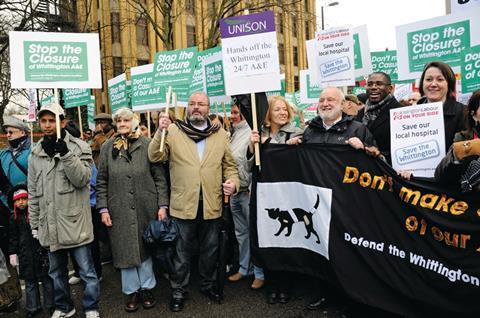NHS managers will face political opposition to their reforms, regardless of the election result on Friday, an HSJ survey of 367 election candidates suggests.

Labour MPs David Lammy (far right) and Frank Dobson (second from right) join a “Save the Whittington Hospital” march in London in February
The survey respondents included 329 parliamentary candidates, of which 178 were from the three main political parties. The results reveal that more than three quarters of all the candidates had included a campaign against local NHS changes in their bid to get elected.
58 per cent of respondents said the average £106,000 pay for a GP in 2007-08 was “too much”
Asked if there were any circumstances under which they would support the closure of an accident and emergency service in their constituency, a third from the three main parties said “no”. Only 44 per cent said they would support that if the service was “clinically unsafe”.
Candidates also failed to back the centralisation of specialist and trauma care - even when presented as an argument for higher quality. Thirty-six per cent of all candidates from the main parties said the consolidation of expertise in large centres was not a valid reason for closing local services.
When asked to rank a list of policies in order of priority, candidates from the main three parties ranked stopping the closure of local hospitals first.
HSJ Post-Election Briefing - Monday 10th May 2010
Attend HSJ’s post-election briefing for an immediate reaction on what the general election result means for you and your organisation.
Places are limited - secure your place now at www.hsj-postelectionbriefing.com
Extended opening hours at GP practices was ranked a close second.
Out of six policies stated by HSJ, more patient choice of hospital provider was ranked lowest, with just 5 per cent of main party candidates giving it highest priority. Faster access to new drugs was ranked just fourth.
HSJ also gave candidates a list of 12 areas which might be considered for cuts in the bid to save £20bn. Politically palatable options such as “invest in prevention” were omitted.
Candidates overwhelmingly selected a ban on branded drugs where generics were available as their most favoured option. In second and third place they selected banning or limiting “ineffective” and “largely cosmetic” procedures, for which the examples given were tonsillectomies, grommets and varicose vein removal.
That could offer some solace to NHS commissioners attempting to make significant savings. The controversial McKinsey report leaked to HSJ last September said up to £0.7bn could be saved a year by limiting or banning such procedures.
There were some differences between the three main parties on their preferred savings route. Conservatives were more interested in revisiting the terms of the NHS pension scheme than the other two parties, with 11 out of 19 Conservatives selecting that.
The same number also opted to put inefficient hospitals under private sector control. But Conservatives were notably less interested in introducing full price NHS prescriptions for those who could afford it - an option selected by 18 per cent of Liberal Democrat candidates and 11 per cent of Labour candidates.
Conservatives also eschewed co-payments, which were supported by a small number of Labour and Liberal Democrat respondents. That is despite 37 per cent of Conservative candidates telling HSJ they had private medical insurance, compared with 7 per cent of respondents overall and 12 per cent of the British public.
But candidates were more united when asked to estimate the proportion of the full time health service workforce working in management.
The correct figure is 3.8 per cent, but the largest share of candidates (28 per cent from the three main parties) selected the largest possible proportion given by HSJ - 14 per cent, with only 13 per cent of total respondents getting the figure right and 5 per cent underestimating.
Consensus was also achieved on pay with 58 per cent of respondents saying the average £106,000 pay for a GP in 2007-08 was “too much” and only one out of a total 369 respondents saying it was “too little”.
No respondents said the average £157,226 for a hospital chief executive in 2009 was “too little” and 86 per cent said it was “too much”.


Do Candidates agree with their party lines?
‘The NHS is an expression of our values as a nation. It is a symbol of collective will, of social solidarity’
David Cameron, Conservatives, 2006
- 98% of Labour candidates agreed, making it their most favoured of the three statements
- 71% of Conservative candidates agreed, making it their least favourite of the three statements
’The NHS of the future will be more than a universal service - it will be a personal service too’
Gordon Brown, Labour, 2008
- 100% of Conservative candidates agreed, making it their most favoured statement
- 82% of Labour candidates agreed, making it their least favourite statement
‘The NHS is a source of pride because it’s built on the basic British principle of fairness’
Nick Clegg, Liberal Democrats, 2010
- 93% of Liberal Democrats agreed, making it their most favoured statement and them the candidates most in tune with their party line
- The King’s Fund recently asked 6,400 online readers to match the same statements to the right party. Only 15 per cent got it right.
- HSJ is holding a post-election briefing in London on 10 May. Speakers will discuss short and long term priorities, finance and more, www.hsj-postelectionbriefing.com























1 Readers' comment